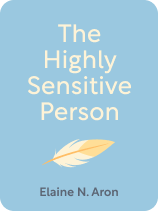

This article is an excerpt from the Shortform book guide to "The Highly Sensitive Person" by Elaine Aron. Shortform has the world's best summaries and analyses of books you should be reading.
Like this article? Sign up for a free trial here.
Are you a highly sensitive person? What are some of the most common HSP struggles?
While high sensitivity isn’t a mental illness, being a highly sensitive person can be challenging in the modern world. In her book The Highly Sensitive Person, psychotherapist Elaine Aron recommends that HSPs can make sense of their experiences by reframing them with high sensitivity in mind.
Here’s how reframing can help you better understand yourself and your trait.
Reframe Past Experiences in the Context of High Sensitivity
Many HSPs find they can benefit from mentally reframing their experiences in the context of high sensitivity. If you grew up not knowing you were an HSP, you may have experienced failures that didn’t make sense to you and that made you feel less-than or broken. Reframing your perspective on these experiences can help you better understand yourself, deal with future challenges, and rebuild your self-esteem.
(Shortform note: Reframing can also help you identify skills you can cultivate to make your future experiences better. In reflecting on your past, you may notice that you encountered emotions you weren’t equipped to handle, such as anger, shame, or fear. Then you can work on building the skills needed to handle these emotions productively, which will help you in the future.)
Reframing is a conscious effort. To reframe, Aron says you first need to reflect on a past experience and how you reacted to it. Consider how your reaction differed from the way you’ve seen others react to the same situation, and remember how you felt about your reaction—perhaps you felt that it was the wrong reaction or it made you feel inferior.
Next, reconsider that reaction based on what you now know about yourself. Was your reaction the result of your HSP traits? If you felt you responded too slowly to a frightening situation, for example, it was likely because you needed longer to process what was happening. Or if you felt you overreacted emotionally, remember that being a highly sensitive person means that you have a higher attunement to others’ emotions.
Finally, apply this new understanding to your present and future experiences. How can you reframe a current, negative experience so you feel better about yourself and can make a better choice in the future? Aron recommends talking to someone else about this new framing or recording it in writing.
| Why Reframing Is Hard, and How to Make It Easier Reframing can be a difficult task for several reasons. Culturally, many of us are taught to avoid or hide our emotions, and we’re rarely taught productive ways of identifying and processing difficult feelings. Particularly for HSPs, who are often told growing up that they’re too sensitive or emotional, dredging up past experiences that evoked negative emotions can be not only daunting but deeply painful. Additionally, HSPs’ tendency to take on others’ emotions makes their experiences even more emotionally charged than the average person’s. However, doing the hard work of reframing is an important aspect of self-compassion. You can make the process easier by approaching it as nonjudgmental self-care and remembering that others have probably had the same or similar experiences that you’ve had. Also, don’t rush it. Grant yourself the time to process the emotions instead of diving straight in toward releasing them. And when it’s time to apply your learning to the present and future, think about these periods with a sense of hope rather than dread or foreboding. Also, identify or build a support system of others who care about you and your well-being and, whenever possible, use humor to add positivity to what you’re experiencing. Finally, you can help yourself make better future choices by building skills like resilience and flexibility, which can help you bounce back from and adapt to unexpected changes. |

———End of Preview———
Like what you just read? Read the rest of the world's best book summary and analysis of Elaine Aron's "The Highly Sensitive Person" at Shortform.
Here's what you'll find in our full The Highly Sensitive Person summary:
- The strengths and challenges associated with being a highly sensitive person
- How to manage your sensitivity in your personal, social, and professional life
- Why you should stop labeling yourself as "shy"






